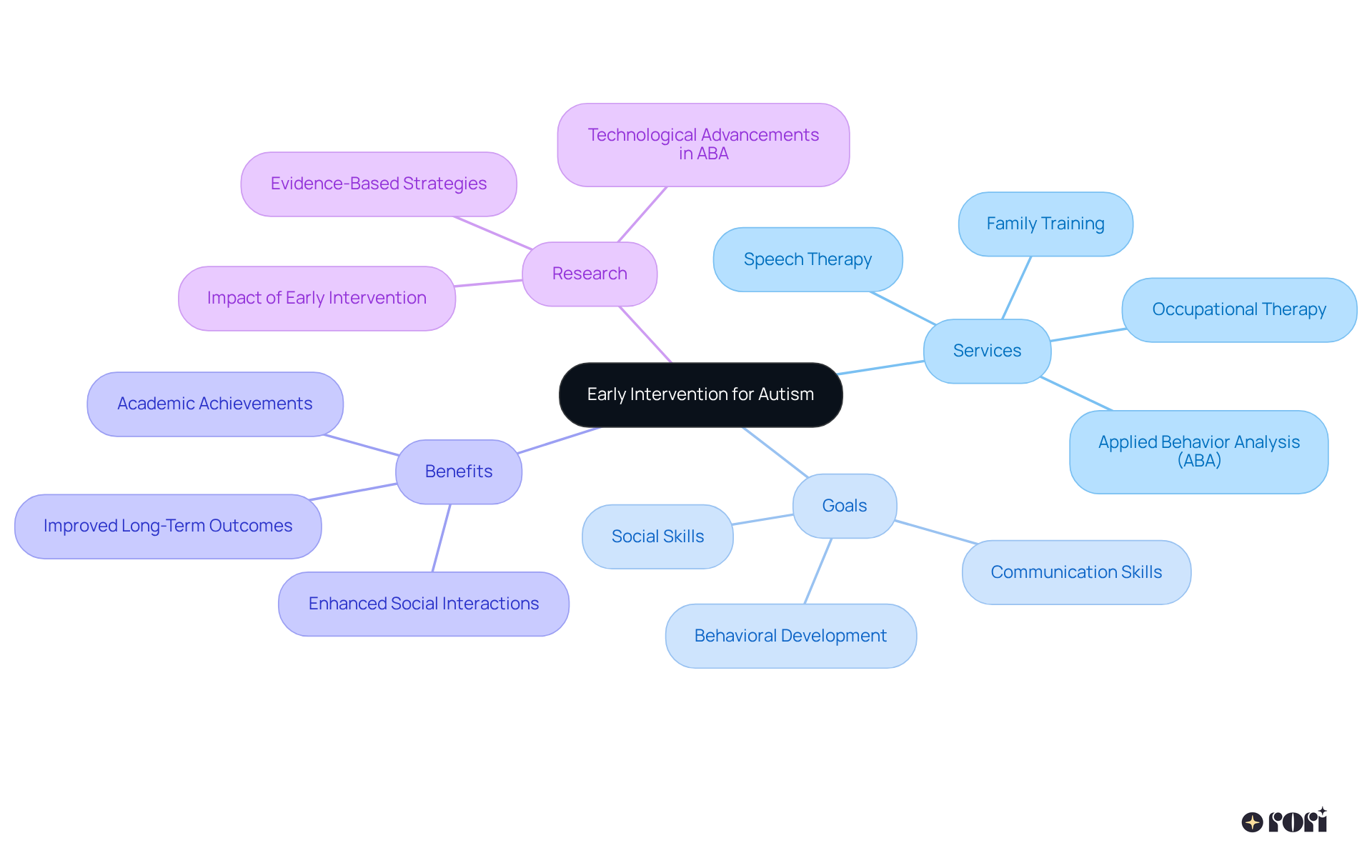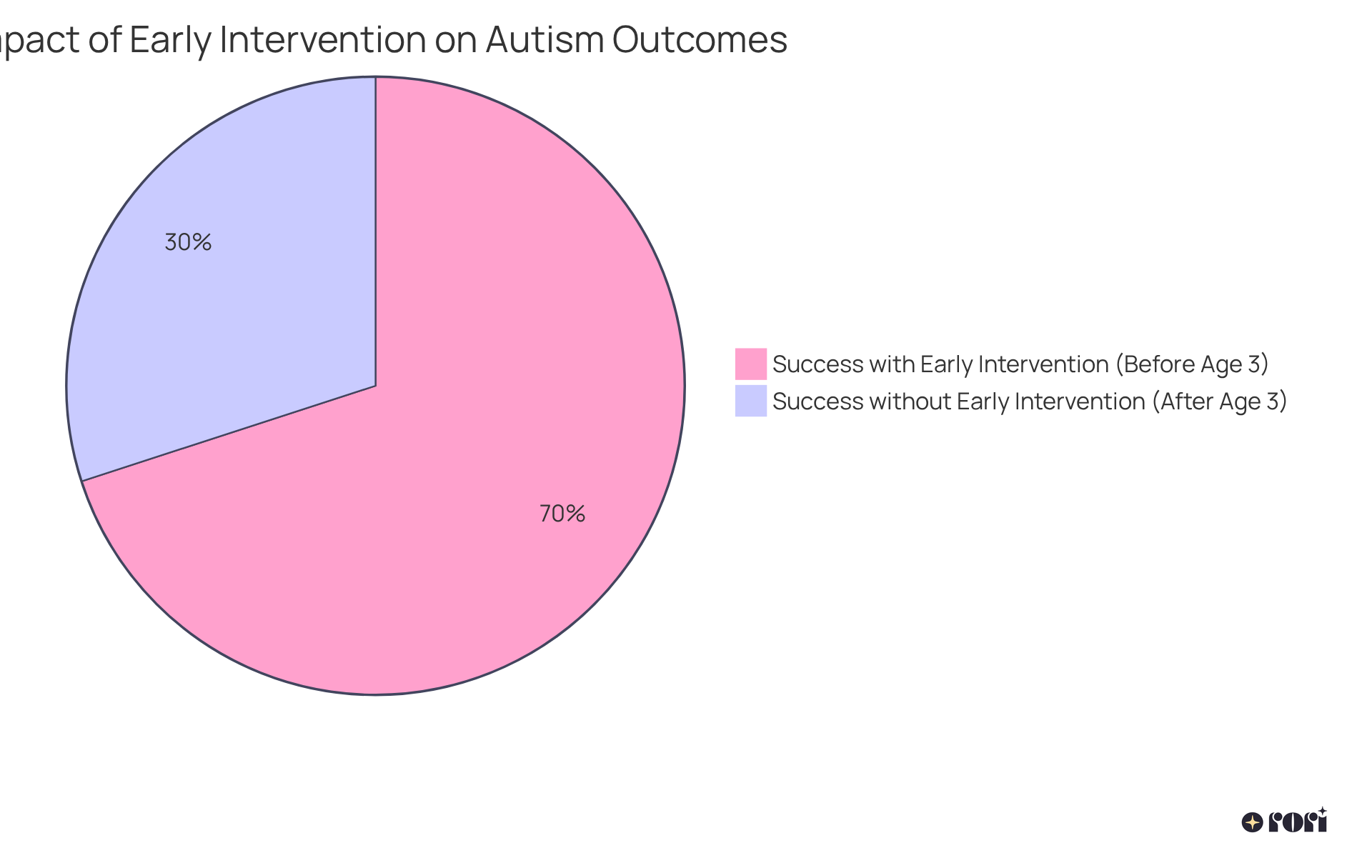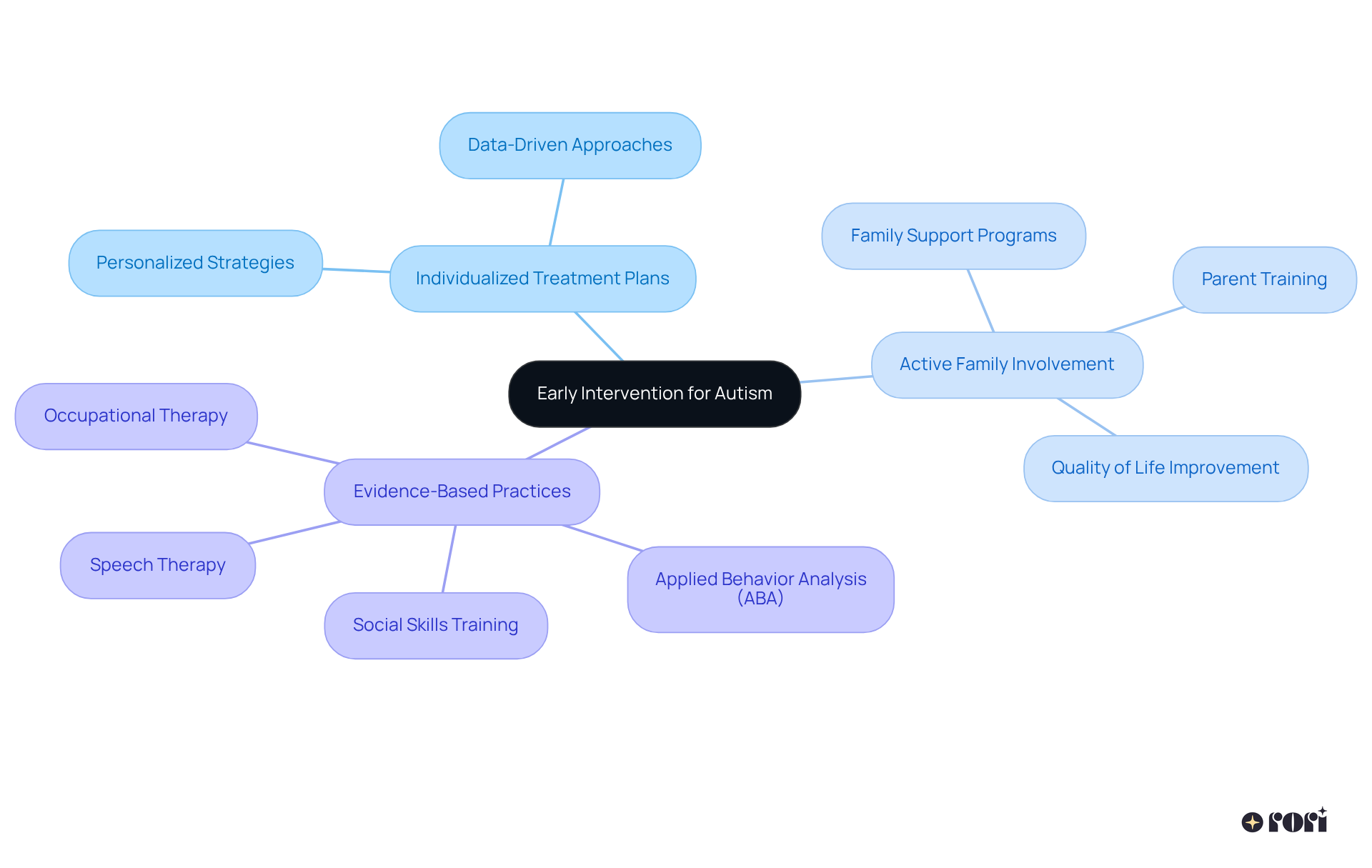Did you know that early intervention for autism is most effective when started between 18 months and 3 years of age? This is such a crucial time for brain development and learning! The article highlights how timely support can really make a difference, significantly boosting cognitive, language, and social skills. Research shows that when we act early, we can see remarkable improvements in developmental outcomes and overall quality of life for children with autism. Let’s explore this together and see how we can make a positive impact!
Understanding the nuances of early intervention for autism can truly change the game for families navigating the complexities of Autism Spectrum Disorder (ASD). Research shows that timely support can significantly enhance developmental outcomes. So, what if the difference between thriving and merely surviving lies in the timing of that assistance?
This article dives into critical insights and strategies surrounding early intervention. Together, we’ll explore how proactive measures can unlock a child's potential and pave the way for a brighter future. Let’s explore this journey together!
Timely support for autism encompasses a variety of services and assistance aimed at helping young individuals diagnosed with Autism Spectrum Disorder (ASD) and their families. These measures can start at birth and typically continue until the individual reaches three years of age, which raises the question of what age is early intervention for autism. The primary goal of this initial support is to foster the young person's development by addressing delays in communication, social interactions, and behavior, which raises the question of what age is early intervention for autism. Research shows that understanding what age is early intervention for autism can significantly improve long-term outcomes for individuals with autism, making it essential to take timely action.
At Rori Care, we’re here to guide your family’s journey with our comprehensive and compassionate Applied Behavior Analysis (ABA) treatment. Our services include individualized planning, where each behavioral plan is crafted to meet the unique needs, strengths, challenges, and goals of your child. We set clear, measurable objectives for behavior change and skill development, providing a transparent way to track progress. Our behavior analysts utilize evidence-based strategies backed by the latest research, ensuring we apply the most effective methods for behavior change.
The initial support services may include:
All tailored to meet the specific needs of each young person. Did you know that youngsters who receive prompt support at what age is early intervention for autism are more likely to develop essential skills? This can lead to better social interactions and academic achievements later in life. For instance, research suggests that children who engage in early ABA therapy can show up to a 50% improvement in communication skills by age five.
Effective early programs have demonstrated remarkable outcomes, with many children showing significant progress in their developmental milestones. As Temple Grandin wisely stated, 'Children need to be introduced to various experiences to grow,' highlighting the importance of early support. The sooner a child receives help, especially when considering what age is early intervention for autism, the more profound the impact on their overall development. As we move through 2025, the focus on proactive assistance is growing, with advancements in technology and personalized care strategies reinforcing its vital role in shaping the future for youth with autism. Rori Care is at the forefront of this movement, offering parent-led ABA solutions and incorporating AI technologies to enhance treatment plans, ensuring families can actively participate in their loved one’s care. Let’s explore this together!

Research consistently shows what age is early intervention for autism is between 18 months and 3 years. This important developmental window is marked by increased brain plasticity, making young children more open to learning and growth. At Rori Care, our clinical leadership team truly values neurodiversity and is dedicated to empowering caregivers with ABA principles and strategies. We believe in supporting behavioral goals through active involvement and data collection. 🌟
Did you know that children who receive support services before age three see remarkable improvements in cognitive, language, and social skills compared to those who start later? For example, interventions begun as early as 18 months have been linked to notable gains in IQ and language development, with an average IQ increase of about 18 points! Plus, young individuals who get early help have a high school diploma completion rate of 70%, while only 30% of those who miss out on early support achieve the same.
This highlights why recognizing what age is early intervention for autism and acting quickly is so important for unlocking a young person's potential and significantly enhancing their overall quality of life. Timely assistance not only fosters immediate developmental benefits but also lays a strong foundation for future success. So, if you suspect your child might need support, please don’t wait! Remember, even a small difference in timing—like 18 versus 27 months—can impact outcomes. Let’s explore this together! As we often say, “Our results suggest the importance of screening and evaluation as early as possible.” We're here to help you every step of the way!

When discussing what age is early intervention for autism, there are a few key components that can really make a difference. Think of individualized treatment plans, active family involvement, and the use of evidence-based practices as the cornerstones of support. Personalized strategies are crucial because they address the unique needs of each child, considering their specific strengths and challenges.
Did you know that what age is early intervention for autism can determine a child's chances of thriving in inclusive educational settings, with those starting therapy by age two being three times more likely to succeed? That’s a powerful reason to understand what age is early intervention for autism! Family participation is also vital. Parents and caregivers are encouraged to join in the support process, which can significantly boost the effectiveness of the strategies used.
In fact, studies show that over 80% of families report a better quality of life and less stress after getting involved in early intervention programs. Isn’t that encouraging? Evidence-informed approaches, like Applied Behavior Analysis (ABA), focus on promoting positive behaviors and teaching new skills through structured methods.
Other helpful strategies might include:
By weaving these components together, early intervention programs can create a nurturing environment that supports a child's growth and well-being. Ultimately, this leads to improved outcomes and greater independence. Let’s explore this journey together!

Timely intervention for autism is absolutely vital for helping young individuals diagnosed with Autism Spectrum Disorder (ASD) thrive. Recognizing the importance of starting support between 18 months and 3 years can truly enhance communication, social skills, and overall quality of life. Early intervention isn’t just about immediate benefits; it lays a strong foundation for future success. That’s why it’s so important for families to seek help as soon as they suspect their child may need support.
This article highlights some key components of effective early intervention, like individualized treatment plans, family involvement, and evidence-based practices such as Applied Behavior Analysis (ABA). These strategies have shown remarkable outcomes, with children receiving early assistance making significant strides in cognitive and social skills. Plus, when parents engage in the intervention process, it boosts the effectiveness of these strategies, leading to a better quality of life for both children and their families.
Ultimately, the message is clear: early intervention is a game-changer for children with autism. By acting quickly and utilizing the right resources, families can unlock their child's potential and pave the way for a brighter future. The importance of understanding and implementing early intervention strategies cannot be overstated—every moment counts in making a lasting impact on a child's development. Let’s explore this together and make a difference!
What is early intervention for autism?
Early intervention for autism refers to timely support services aimed at helping young individuals diagnosed with Autism Spectrum Disorder (ASD) and their families. It includes various services that can begin at birth and typically continue until the individual reaches three years of age.
What is the primary goal of early intervention for autism?
The primary goal of early intervention is to foster the young person's development by addressing delays in communication, social interactions, and behavior.
Why is it important to understand the appropriate age for early intervention?
Understanding the appropriate age for early intervention is crucial because timely action can significantly improve long-term outcomes for individuals with autism.
What services are typically included in early intervention programs?
Early intervention programs may include Applied Behavior Analysis (ABA), speech therapy, occupational therapy, and family training, all tailored to meet the specific needs of each young person.
How can early intervention impact a child's development?
Early intervention can lead to better social interactions and academic achievements later in life. Research indicates that children who engage in early ABA therapy can show up to a 50% improvement in communication skills by age five.
What evidence supports the effectiveness of early intervention programs?
Effective early intervention programs have demonstrated remarkable outcomes, with many children showing significant progress in their developmental milestones.
How is Rori Care involved in early intervention for autism?
Rori Care provides comprehensive Applied Behavior Analysis (ABA) treatment, including individualized planning and evidence-based strategies to support the unique needs of each child and track their progress.
What advancements are being made in early intervention for autism?
Advancements in technology and personalized care strategies are enhancing early intervention, with a growing focus on proactive assistance and parent-led ABA solutions, including the use of AI technologies to improve treatment plans.